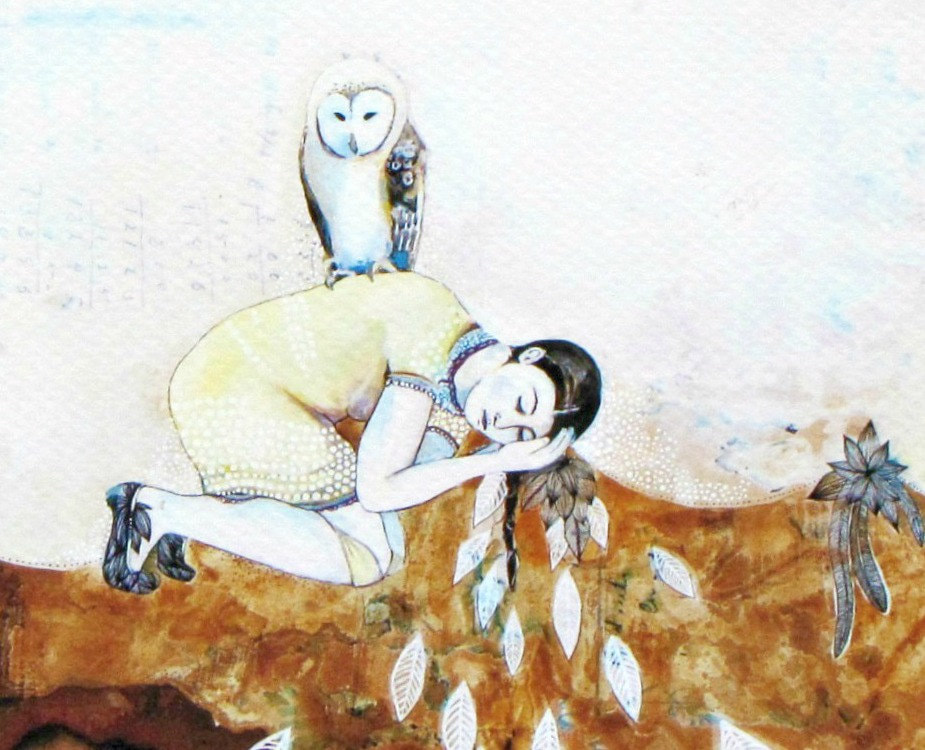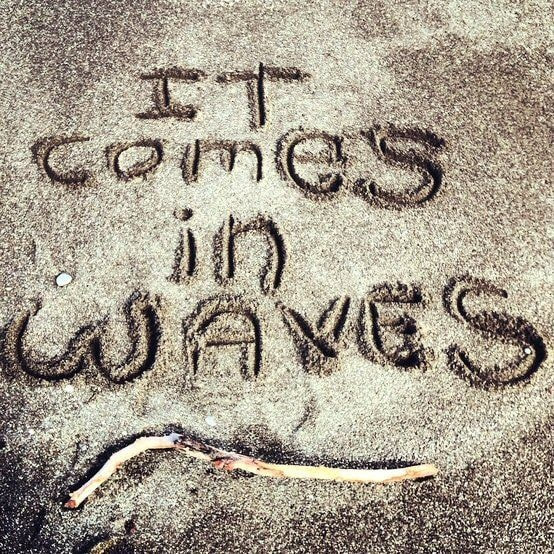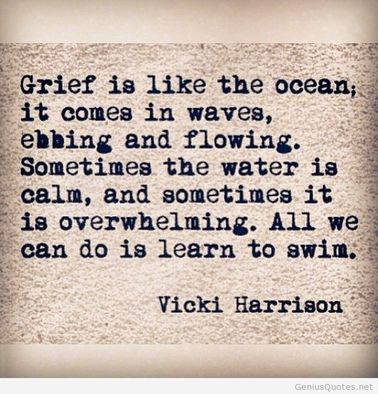Side by side, grief, and joy. Grief is the price we pay for love. When we lose something that we loved, that was a part of us, it is a long, sometimes lifelong journey of grieving. In most cultures, grieving is a community thing. You are urged to have support. There are people who grieve with you, who hold space for you, so you can be submerged in the waters of emotion, and thrash about, without dying yourself. Grieving hurts. But it is so necessary, not only for you, but for the person or thing lost, and for the ancestors, and also, for your community.
In his talk, "Grief and Praise", Mayan Shaman Martin Prechtel says that they are one in the same thing; they come from the same muscle. If you cannot grieve, you cannot praise. And to him, fully grieving, is where you "look bad" when you are done; your hair is torn out, your clothes are ripped, and you are down in the street.
Your (true) friends and family watch out for you, and allow you to fall apart, but not drown in the ocean. They take care of you, they allow, even encourage.
Your true grief will bring up their own. Your vulnerability allows for others to have theirs. It works like that.
It is because you loved so much, that you grieve. Your praise is there, too, just as in your praise of things, lies a twinge of sadness, because all good things end one day.
Including you.
Some things cannot fully take their next step, until they are fully grieved, fully felt.
Ancestors, and the dead, including.
In my work with helping beings to take their next step, stuck pain, and grief can be the cause of them not leaving, not able to leave.
They, too, need their story heard, and need to release all that pain.
Do you think some of your ancestors died that way? Perhaps we carry some of it, and it is a family trait. Stuck energy can become toxic, no matter where it is.
Grieving is not just about people. It can be about a part of you, a forgotten dream, a powerful incomplete. Perhaps an animal, or not living up to potential.
It can be an exile of sorts. Or a communal pain. A cultural one. An ancestral one.
We can grieve collective pain.
Grief is not depression. That is the absence of it. That creates ghosts. It creates sickness. Unexpressed, held in grief, can solidify; it can become a tumor, a sickness, a toxic stone. It will manifest in the inability to feel joy, to fully praise, to love, to feel alive. When we stop the heart, we become shallow.
It may keep you stuck at that place or time, unable to move on, or to dream a new dream.
There can be a tendency to inflict pain on others, in that closed hearted place. It can be a dangerous thing, indeed, when a person (even unconsciously) tries to invoke that humanity inside themselves, that pain, by hurting those around them, perhaps, because they do not have access to their own, or it is not safe to grieve.
That must be what it is like, in the middle of a war. It can turn into violence.
It can become a burden on the living.
This solidified sorrow can be stuck in our family lines also. Our ancestors who did not grieve, and were not grieved for, unfortunately pass it down the generational line. We hold onto it, as sickness, as burden, as depression, and also as the inability to fully express joy, and praise.
We in turn will pass ours down.
Some cultures make it harder to express their emotions publicly; or to stay in grief, or are not ritually accepted as communal practice. Some are.
In our Western culture, and also in some Christian religions it seems, the habit to be stoic, virtuous, to keep it together, and to hide emotions, (or to anesthetize them), robs us of our ceremony, our ritual, our space to fall apart, to feel all the feelings. Not just alone, but in a connected space with others.
That there are ritual actions, like the cutting of one's hair, or wearing all black. Communities can work together, like one organism, in holding space, or in grieving as well. Symbolic completions, like church ceremonies, or gatherings, help greatly, but that does not happen for a loss like an animal, or a vocation, a deep friendship, or the maiming of the sacred land where you live.
Some people need to be 'provoked" into grieving. The possibilities, of that lost dream need also to be grieved. The stories told, and heard. Let out.
Not necessarily acted upon.
There can be anger, feelings of revenge, the stuff, the stories. This needs to come out of the muscles, out of the body, out of the heart, and be expressed, and be heard.
You may need to keep the fire going for a while, to allow, or, to have others help to do that for you.
Or you may need to do that for another. Ask the questions, and allow what comes up to be heard. Know, and accept that persons limits, also (or your own).
Grieving people do not need to be fixed; they need to be heard. Do not let them drown in the big waves. But let it be felt.
Grieving is active. Wretched grief, is cathartic. It happens in the body, in the muscles. It is necessary, and should not be postponed. It is not a preference, and not a deference.
It may feel overwhelming, like massive turbulent waves, that knock you over, and thrash you about. A smell, a memory, an unsaid word. Some trigger.
It may seem unending. But, after a while, you realize that you did not die, that you made it through. After a while, they come less frequently. After a while, it becomes a scar, that you still feel, on occasion, but has become a part of you. And we are here to love, and to be loved, to experience, and to have scars.
Fully grieving is natural, and it takes courage. And like the word "courage", it's root, comes from the heart. It becomes a badge of honor that you wear, on your spirit.
And from that real place, comes growth. The seeds of praise are there, the reasons why you loved what you did. The reasons why it hurts so bad, the good that it was. The good that is there. The love that is there. The praise of what you lost. That is the honey, in the heart.
Some things in life, are just hanging on. You haven't processed them, because you are afraid, or numb, or haven't made a full decision.
You must let them die. Let them fully die, so you can begin to grieve it.
You may need help from community. You may need to use ceremony, or ritual. Ask your angels, and guides for help, if you have no one.
Christina Pratt, in her "Why Shamanism Now" podcast, says about grief:
Be with nature. Cry into the earth, your wretchedness, and let her take it from you. Or let your tears go into the water. Allow. Thank. be gracious. Leave an offering. Or write and write your stories, and your feelings, and burn them, and let the fire consume them, and the air take them. Talk with someone. Moan and wail to the crashing waves, until you are empty.
But until you do, you will cut off, from your heart, the other side of this, which is the praise of the thing you had, or were, or loved. The reasons why. The love.
Sometimes as you give yourself the space to grieve something, like an ended marriage, for example, you can find the lost dream there, and untangle it. After grieving your loss, and knowing the praise, and the love there, you can have the space to dream again.
We do all of this, to be real, to be alive, to be in the present, so we can return to the serious, and awesome business of the intimate relationship with life.
So we can begin again.
Grief can be messy, can be ugly, can be very, very, old, or just yesterday, but the doing of this sacred act, invites in, it's counterpart of praise, of love, and with it, a badge of honor, the ability to start again, and the sweet alchemy of grace.
Helena Mazzariello copyright 2017



 RSS Feed
RSS Feed